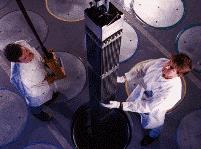The Council of the European Union will contribute up to €25 million ($32 million) towards an international nuclear fuel bank controlled by the International Atomic Energy Agency (IAEA), bringing the prospect a step closer.
 |
| A nuclear fuel assembly |
The nuclear fuel bank will be part of a broader effort to provide multilateral fuel supply mechanisms, and the EU intends to pursue in-depth third-party discussions on the development of different solutions for different needs "in the near future".
The IAEA fuel bank is one of several proposals for providing countries that wish to start using nuclear power with a mutually assured nuclear fuel supply while preserving the best possible safety, security and non-proliferation conditions. The US-based Nuclear Threat Initiative (NTI) organization pledged $50 million of funding for the bank in September 2006, conditional on nations providing a further $100 million. The EU's $32 million joins Norway's February pledge of $5 million, and pledges from the USA ($50 million) and the United Arab Emirates ($10 million) made in August.
Enrichment is a vital step in the manufacture of the low-enriched uranium fuel used in nuclear power reactors, but enrichment technology can also be used to produce highly-enriched uranium suitable for use in nuclear weapons, and is therefore seen as a nuclear proliferation risk. Likewise, reprocessing facilities can be used to recover uranium and plutonium from spent reactor fuel for re-use in power generation but could also be used to recover the materials for military use. Iran is currently under United Nations sanctions because of its refusal to halt the development of a domestic uranium enrichment program which it claims is meant for civilian use.
The IAEA has been considering possible multilateral approaches to the civil nuclear cycle for a number of years, with several proposals on the table including, Russian-led plans to set up an International Enrichment Centre under IAEA supervision at Angarsk in Eastern Siberia.






_15863.jpg)







